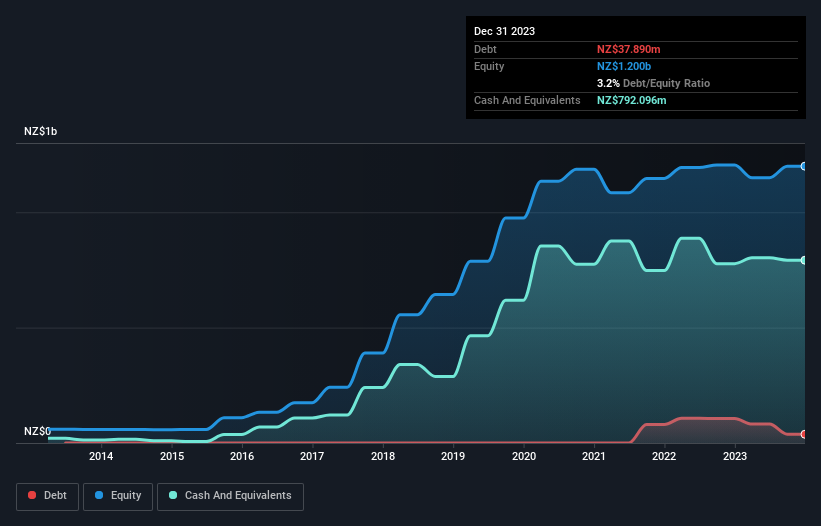Some say volatility, rather than debt, is the best way to think about risk as an investor, but Warren Buffett famously said that 'Volatility is far from synonymous with risk.' So it might be obvious that you need to consider debt, when you think about how risky any given stock is, because too much debt can sink a company. As with many other companies The a2 Milk Company Limited (NZSE:ATM) makes use of debt. But the real question is whether this debt is making the company risky.
What Risk Does Debt Bring?
Debt assists a business until the business has trouble paying it off, either with new capital or with free cash flow. If things get really bad, the lenders can take control of the business. However, a more common (but still painful) scenario is that it has to raise new equity capital at a low price, thus permanently diluting shareholders. Having said that, the most common situation is where a company manages its debt reasonably well - and to its own advantage. When we examine debt levels, we first consider both cash and debt levels, together.
View our latest analysis for a2 Milk
What Is a2 Milk's Net Debt?
As you can see below, a2 Milk had NZ$37.9m of debt at December 2023, down from NZ$106.2m a year prior. But on the other hand it also has NZ$792.1m in cash, leading to a NZ$754.2m net cash position.

How Strong Is a2 Milk's Balance Sheet?
The latest balance sheet data shows that a2 Milk had liabilities of NZ$348.2m due within a year, and liabilities of NZ$52.7m falling due after that. Offsetting these obligations, it had cash of NZ$792.1m as well as receivables valued at NZ$87.6m due within 12 months. So it actually has NZ$478.7m more liquid assets than total liabilities.
This surplus suggests that a2 Milk has a conservative balance sheet, and could probably eliminate its debt without much difficulty. Succinctly put, a2 Milk boasts net cash, so it's fair to say it does not have a heavy debt load!
And we also note warmly that a2 Milk grew its EBIT by 11% last year, making its debt load easier to handle. There's no doubt that we learn most about debt from the balance sheet. But it is future earnings, more than anything, that will determine a2 Milk's ability to maintain a healthy balance sheet going forward. So if you want to see what the professionals think, you might find this free report on analyst profit forecasts to be interesting.
Finally, a company can only pay off debt with cold hard cash, not accounting profits. a2 Milk may have net cash on the balance sheet, but it is still interesting to look at how well the business converts its earnings before interest and tax (EBIT) to free cash flow, because that will influence both its need for, and its capacity to manage debt. Over the last three years, a2 Milk actually produced more free cash flow than EBIT. There's nothing better than incoming cash when it comes to staying in your lenders' good graces.
Summing Up
While it is always sensible to investigate a company's debt, in this case a2 Milk has NZ$754.2m in net cash and a decent-looking balance sheet. And it impressed us with free cash flow of NZ$160m, being 103% of its EBIT. So we don't think a2 Milk's use of debt is risky. Another factor that would give us confidence in a2 Milk would be if insiders have been buying shares: if you're conscious of that signal too, you can find out instantly by clicking this link.
When all is said and done, sometimes its easier to focus on companies that don't even need debt. Readers can access a list of growth stocks with zero net debt 100% free, right now.
New: AI Stock Screener & Alerts
Our new AI Stock Screener scans the market every day to uncover opportunities.
• Dividend Powerhouses (3%+ Yield)
• Undervalued Small Caps with Insider Buying
• High growth Tech and AI Companies
Or build your own from over 50 metrics.
Have feedback on this article? Concerned about the content? Get in touch with us directly. Alternatively, email editorial-team (at) simplywallst.com.
This article by Simply Wall St is general in nature. We provide commentary based on historical data and analyst forecasts only using an unbiased methodology and our articles are not intended to be financial advice. It does not constitute a recommendation to buy or sell any stock, and does not take account of your objectives, or your financial situation. We aim to bring you long-term focused analysis driven by fundamental data. Note that our analysis may not factor in the latest price-sensitive company announcements or qualitative material. Simply Wall St has no position in any stocks mentioned.
About NZSE:ATM
a2 Milk
Sells A2-type protein type branded milk and related products in Australia, New Zealand, China, rest of Asia, and the United States.
Excellent balance sheet with moderate growth potential.
Similar Companies
Market Insights
Community Narratives


Recently Updated Narratives


MINISO's fair value is projected at 26.69 with an anticipated PE ratio shift of 20x


The Quiet Giant That Became AI’s Power Grid


Nova Ljubljanska Banka d.d will expect a 11.2% revenue boost driving future growth
Popular Narratives


The company that turned a verb into a global necessity and basically runs the modern internet, digital ads, smartphones, maps, and AI.


MicroVision will explode future revenue by 380.37% with a vision towards success



